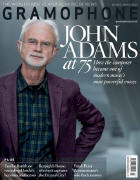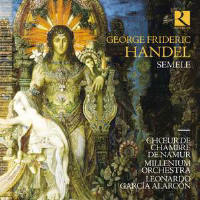Texte paru dans: / Appeared in: |
|
|
Outil de traduction |
|
|
Reviewer:
David Vickers Leonardo García Alarcón cuts Semele copiously yet reinstates two numbers that Handel rejected and never performed. Part 1 is given complete (paradoxically, where Gardiner’s recent live Alexandra Palace interpretation – SDG, 9/20 – shaved off a fair bit of running time), and the exuberant Sinfonia setting the scene for Iris’s hasty report to the furious Juno at the start of Part 2 is dropped. Widespread cuts cause enormous damage to Part 3 (meaning that Lawrence Zazzo contributes next to nothing after Act 1 scene 2). Cupid’s ‘Come, Zephyrs, come’ is restored to Act 2 scene 2, albeit positioned incorrectly and implausibly after Semele’s ‘O sleep, why dost thou leave me’ instead of beforehand. Moreover, the composer’s rejected triple-time aria setting of Juno’s ‘Behold in this mirrour’ is included, again in the wrong place; bizarrely, Alarcón also performs Handel’s preferred recitative/ arioso setting of Juno’s words, followed by Semele’s beguiled reaction upon looking in the mirror (‘O ecstasy of happiness’, not printed in Ricercar’s libretto), after which we hear Juno’s aria needlessly repeating the same words that she just sang a few moments ago, rendered nonsensical because by now Semele has already gazed into the mirror. Three singers double up on different roles – just as Handel’s original cast did at Covent Garden in 1744. Andreas Wolf kicks off Cadmus’s opening scene with blustering energy and returns as Somnus at the start of Part 3: its hurried Sinfonia lacks sleepiness but ‘Leave me, loathsome light’ has affectionately sustained drowsiness. Dara Savinoya’s sorrowfully lovelorn Ino delivers a touchingly despondent ‘Turn, hopeless lover’, featuring rapturous obbligato cello and judicious organ continuo, and there is suitable transformation in her personality and vocal colour for Juno’s imperious jealousy and implacable fury. Matthew Newlin’s Jupiter conveys playful mischief and seductive sotto voce tenderness in all the right places, although forced dynamic velocity and overwrought embellishments occasionally get out of hand; the tenor reappears for Apollo’s brief cameo announcing the birth of Bacchus from Semele’s ashes. Ana Maria Labin’s extended coloratura in Semele’s ‘The morning lark’ has sensual gravity. Darkened vowels smoulder in ‘Endless pleasure’ but misfire on ‘gazing’ in ‘Myself I shall adore’. There is beguiling intimacy in ‘O sleep, why does thou leave me’ (accompanied sensitively by cello and theorbo), and haughty sarcasm in ‘No, no, I’ll take no less’. Less happily, the rapturous duet with Ino (‘Prepare then, ye immortal choir’) is undone by mismatched tuning. Athamas is no shrinking violet thanks to Zazzo’s spirited ‘Hymen, haste’, whereas ‘Your tuneful voice’ has passionate intimacy. Chiara Skerath’s steely Iris shares little sense of ‘sweet retreat’ when describing Semele’s secret hideaway. Gwendoline Blondeel’s airiness in Cupid’s ‘Come, Zephyrs, come’ is undermined in the middle section by Alarcón’s dizzying acceleration and addition of a chirpy recorder – incongruences likelier to agitate than calm Semele. Otherwise, Alarcón’s phrase-shapes, harmonic details and pacing tend to be persuasive. Millenium Orchestra play with broad colours and vivacity, their oboes and bassoons pleasingly to the fore in the firmly delineated Overture. The Namur Chamber Choir’s panicked ‘Avert these omens’ (with thundering timpani) and ‘Hail, Cadmus, hail’ (with braying horns) are thrilling, ‘How engaging, how endearing’ sways amorously and the sad reaction to Semele’s fate in ‘Oh, terror and astonishment’ expresses the concept vanitas vanitatum (‘all our boasted fire is lost in smoke’) across contrapuntal strands with emotional solemnity. |
|




